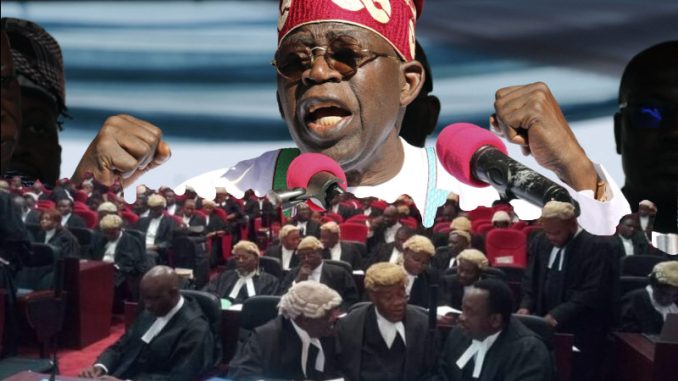
Finally, the “EYES ON THE JUDGES” movement was blatantly blinded while the dozy and comatose legal luminaries that made up the tribunal unfolded the blind, snatched the scale and broke the sword on the ‘Lady Justice’ statute on Wednesday, the 6th of September 2023. I was not surprised as I watched the event unfold live on the 9News Nigeria platform, owing to the fact that we are in Nigeria.
The presidential election petition tribunal’s verdict upholding President Tinubu’s victory has generated intense debate and raised important questions about the influence of incumbency and the fairness of the Nigerian judicial system. The dismissal of witness testimonies and concerns about corruption within the judiciary have further fueled skepticism and underscored the need for comprehensive judicial reforms. As Nigerians grapple with these challenges, the pursuit of a fair and transparent electoral process remains crucial for the country’s democratic development.
In a historic ruling, the Presidential Election Petition Court in Abuja upheld the “INEC-Announced” victory of President Bola Tinubu in the 2023 Nigerian presidential election. The verdict, delivered after a 12-hour marathon session, dismissed the petitions filed by the opposition parties challenging Tinubu’s legitimacy as president. While the court cited a lack of merit for the dismissal, many Nigerians have raised concerns about the influence of incumbency, and the fairness of the judicial process. This article delves into the details of the status quo of the verdict, explores the reactions of Nigerians, and examines the broader issue of endemic corruption within the Nigerian judicial system.
The Presidential Election Petition Court’s Verdict
The five-member panel, led by Justice Haruna Tsammani, unanimously upheld the victory of President Tinubu, declaring him the duly elected President of the Federal Republic of Nigeria. The court dismissed the consolidated petitions of the Peoples Democratic Party (PDP), the Allied Peoples Movement (APM), and the Labour Party (LP) for lack of merit, the judges said. The judges ruled that the petitioners failed to provide substantial evidence to support their claims of voting irregularities, qualification issues, criminal record of the APC’s candidate and other alleged infractions.
In the case of the APM, the court held that the issues raised in their petition were pre-election matters that should have been brought before the Federal High Court. The court also affirmed that the Federal Capital Territory (FCT) should be treated like any other state, rejecting the argument that Tinubu’s failure to secure 25% of the votes in the FCT invalidated his election. Additionally, the court dismissed the LP’s petition, stating that the Independent National Electoral Commission (INEC) had the liberty to prescribe the mode of results transmission and that the petition lacked specific evidence of non-compliance.
Reactions from Nigerians
The ruling by the Presidential Election Petition Court has sparked mixed reactions among Nigerians. While supporters of President Tinubu celebrate the affirmation of his victory, many opposition supporters and civil society groups have expressed disappointment and skepticism. They argue that the court’s decision raises concerns about the independence and impartiality of the judiciary, particularly regarding the influence of incumbency.
One of the key points of contention is the dismissal of the witness testimonies and exhibits presented by the presidential candidate of the Labour Party, Peter Obi. The court rejected the statements of 10 out of the 13 witnesses, citing procedural irregularities. This decision has raised questions about the fairness of the judicial process and the extent to which the influence of incumbency may have influenced the judges’ rulings.
The Influence of Incumbency on the Judicial System
The influence of incumbency in the Nigerian political landscape is a long-standing issue that has raised concerns about the fairness and integrity of the electoral process. Incumbents often enjoy advantages such as access to state resources, control of the media, and the ability to influence the judiciary and other arms of the government. In the case of President Tinubu, his position as the sitting president may have played a role in shaping the outcome of the election petition tribunal.
Critics argue that the power of incumbency can be used to intimidate and manipulate the judiciary, compromising its independence and impartiality. They point to the dismissal of witness testimonies, the speedy delivery of the verdict, and the overall lack of transparency in the process as indicators of potential interference. These concerns highlight the need for judicial reforms and greater accountability to ensure a level playing field for all political actors.
Corruption within the Nigerian Judicial System
The issue of corruption within the Nigerian judicial system is not a new one. The country has long struggled with widespread corruption, and the judiciary has not been immune to this problem. Bribery, political interference, and nepotism are among the issues that have plagued the system, eroding public trust and undermining the rule of law.
The allegations of corruption within the judicial system have further fueled suspicions about the fairness of the election petition tribunal. Critics argue that the ruling may have been influenced by behind-the-scenes deals, political pressure, or financial inducements. This raises concerns about the integrity of the judiciary and the ability of citizens to seek justice through the legal system.
Calls for Judicial Reforms
The ruling by the Presidential Election Petition Court has reignited calls for comprehensive judicial reforms in Nigeria. There is a growing consensus among civil society organizations, legal experts, and concerned citizens that urgent action is needed to address the issues of corruption, inefficiency, and lack of transparency within the judiciary.
Some of the proposed reforms include the establishment of an independent body to investigate and prosecute corrupt judges, the implementation of stricter ethical standards and accountability mechanisms, and the promotion of judicial autonomy to insulate judges from political interference. These reforms aim to restore public confidence in the judiciary and ensure the integrity of the electoral process.
By Obinna Ejianya @obinna_ejianya (9News Nigeria – Melbourne, Australia)
